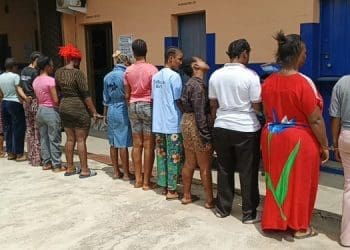More than a year after Heath Goldfields, a company backed by the Government of Ghana, in bizarre circumstances took control of the Bogoso-Prestea Mine from Blue Gold Bogoso Prestea Limited, a successor to Future Global Resources (FGR), the takeover has degenerated into one of the most bruising labour and investment disputes in the country’s mining history.
Over 400 laid-off workers are accusing Heath Goldfields — owned by former Finance Minister Dr. Kwabena Duffuor — of deceit, unfair treatment, and blatant disregard for their rights.
Speaking at a press conference, the aggrieved workers led by Gabriel Madobi Oklettey, Convener of the former Workers, complained of non-payment of lawful entitlements, discrimination, and mismanagement, warning that the situation has left hundreds of Ghanaian families destitute.
The mine, once touted as a potential turnaround project, has instead become a symbol of mistrust, alleged state complicity, and growing investor anxiety over Ghana’s regulatory credibility.
Workers cry foul: Broken promises and betrayal
According to the petition, Heath Goldfields dismissed over 400 workers shortly after taking control of the mine, citing “operational restructuring” and the need to place the operation under “care and maintenance.”

The workers said they accepted their retrenchment in good faith, trusting the company to honour all lawful entitlements, including salary arrears, bonuses, provident fund contributions, and severance pay.
However, over a year later, they allege that only partial payments covering portions of salary arrears and provident fund contributions have been made.
“Beyond these limited payments, Heath Goldfields has failed to honour its full obligations,” the petition read.
Worse still, the workers accuse the company of discriminatory practices, claiming that compensation has been selectively paid to individuals “aligned with certain union interests,” leaving others without any form of support.
“The situation has plunged many families into severe hardship,” one worker lamented. “We were told to trust the process, but the company has only deceived us and delayed justice.”
Govt intervention and defiance
Following months of tension, the affected workers petitioned the Member of Parliament (MP) for Prestea Huni Valley, the Western Regional Minister, and the Minister of Lands and Natural Resources, Mr. Emmanuel Armah-Kofi Buah.
In response, the Lands Minister visited the mine on May 24, 2025, after which he issued a 120-day ultimatum to Heath Goldfields to commence payments to the affected workers.
That directive led to limited payments for a few employees, but five months on, the petitioners say the company has not complied with the minister’s instructions.
“Without this intervention, not a single non-unionised worker would have received any compensation,” the petition stated.
Unfulfilled commitments and moving goalposts
The petition cites a memorandum dated August 27, 2025, in which Heath Goldfields committed to settling all outstanding provident fund contributions and benefits by the end of September.
But as of the end of October, less than half of the affected workers had received their entitlements.

A subsequent memo further extended the payment deadline to December 2025, which the workers say reflects “continued bad faith and evidence of financial incapacity.”
The workers also claim that the company has offered no assurance regarding the payment of the 2023 annual bonus, end-of-service benefits, accrued leave days, or redundancy packages — a direct violation of Section 18 of the Labour Act, 2003 (Act 651), which mandates the full settlement of benefits upon termination of employment.
Accusations of mismanagement and illegal operations
Beyond the unpaid benefits, the petitioners allege serious operational breaches and regulatory violations, including the unauthorised movement of gold-bearing materials from the site to undisclosed locations — in violation of mining protocols.
They claim that Heath Goldfields has refused to engage transparently with workers, regulators, and community stakeholders, heightening mistrust and repeated disruptions at the mine.
The petition further asserts that the company was granted the Bogoso-Prestea mining lease on condition that it would settle all outstanding debts and liabilities FGR/Blue Gold inherited from Golden Star Resources — a condition it has failed to fulfil.
“This failure undermines the credibility of the entire lease transfer process and raises serious concerns about the due diligence conducted before the reassignment,” the petition noted.
Workers demand justice and transparency
For the 400 laid-off workers, the dispute has gone beyond corporate rivalry — it is now a matter of survival.
They are urging the Minister of Lands and Natural Resources, the Minerals Commission, and all relevant authorities to compel Heath Goldfields to pay all outstanding entitlements, including provident fund arrears, severance, and bonuses.
They are also calling for a comprehensive financial and operational audit of Heath Goldfields to establish whether the company possesses the capacity to responsibly manage the Bogoso-Prestea mine.
A controversial lease transfer
The reassignment of the Bogoso-Prestea mine lease to Heath Goldfields sparked intense controversy and accusations that the Ministry of Lands and Natural Resources, the Minerals Commission, and Heath Goldfields acted in concert to unlawfully dispossess FGR/Blue Gold of their mining rights.
Industry analysts say the timeline of events bears all the hallmarks of a coordinated scheme.
Heath Goldfields — incorporated on February 6, 2024, with a stated capital of GH₵10,000 — applied for the mining lease just a week later, on February 13, despite the lease still being legally held by FGR/Blue Gold.
By November 12, 2024, the Ministry had approved the Minerals Commission’s recommendation to reassign the lease to Heath Goldfields.
In a puzzling twist, a second letter dated November 20 suspended all reassignment processes, yet four days later, Heath Goldfields had already mobilized to site and forcibly occupied the mine — seizing vehicles, residential assets, and even gold stockpiles belonging to FGR.
Observers say the occupation violated Act 703, as parliamentary ratification, Environmental Protection Agency (EPA) approval, and Mine Inspectorate certification had not been secured.
A mining expert described the bizarre development as “an institutionally sanctioned galamsey cloaked in officialdom.”
FGR’s troubled tenure and forced exit
FGR acquired the Bogoso-Prestea mine from Golden Star Resources in October 2020, inheriting a $60 million debt burden.
Despite commitments to recapitalise and modernise operations, the company faced labour unrest, unpaid severance inherited from Golden Star, and delays in social security payments.
After repeated negotiations and partial settlements, tensions escalated.
By 2023, union leaders — reportedly frustrated with delays — petitioned the government to revoke FGR’s lease.
In response, Blue Gold Bogoso Prestea Limited, a successor to FGR, backed by new financing commitments and a $150 million bond issuance listed on Nasdaq, with an additional $80 million facility secured.

On January 30, 2024, the restructuring plan was submitted to the Ministry and the Minerals Commission and received conditional approval in April.
Blue Gold subsequently met all financing conditions, but before operations could restart, the lease was abruptly terminated in September 2024, followed by a backdated termination notice in January 2025.
The sequence of events confirms a coordinated effort to dispossess Blue Gold and hand over the asset to a politically connected operator.
International arbitration and a $1bn claim
Blue Gold has since filed for international arbitration, seeking $1 billion in damages for what it describes as “state-enabled expropriation” and breach of Ghana’s investment treaties.
The company insists it retains the financial and technical capacity to operate the mine and has offered to withdraw its claim if its lease is restored.
Meanwhile, Heath Goldfields continues to occupy the mine, reportedly operating without full statutory permits from the EPA, the Water Resources Commission, and the Mine Inspectorate.














